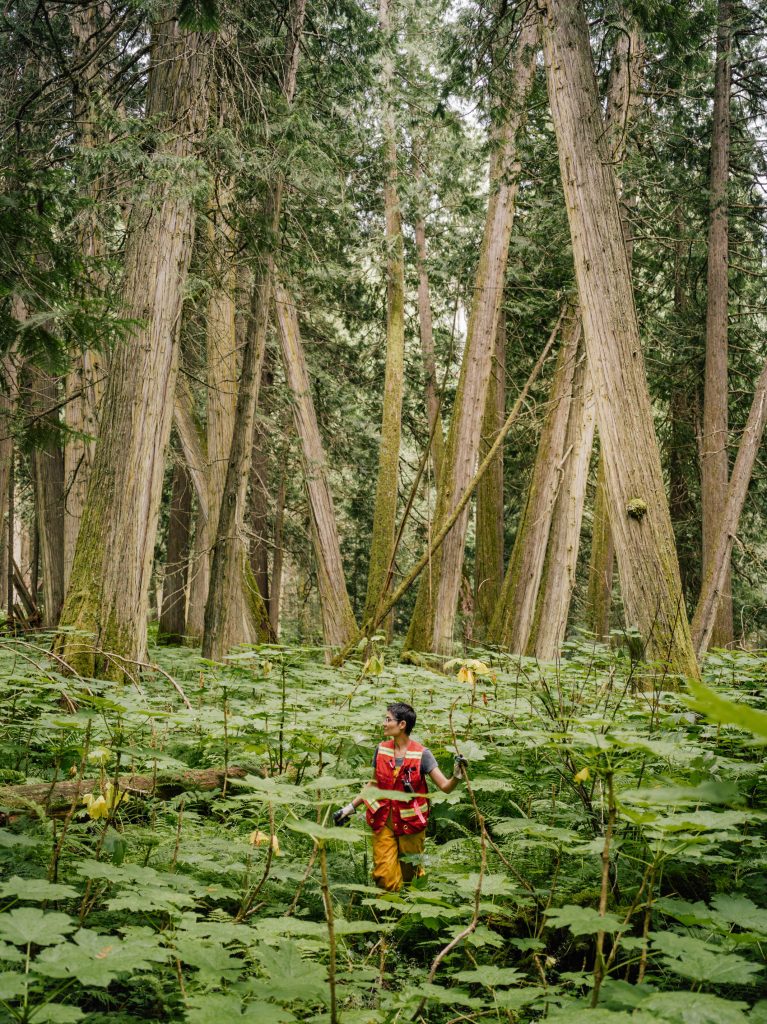Canada’s forests are one of the world’s most important carbon sinks and as such, a powerful defence against climate change. They are also the home to rural, remote, and Indigenous communities that rely on the forest for their sustenance, culture, and economic prosperity. Unfortunately, these forests are increasingly at risk of moving from carbon sink, to a global atmospheric carbon source, creating a significant global threat while putting communities directly on the front line of a new and dangerous climate reality. In response, Ecotrust Canada is committed to developing natural climate solutions – community-led, climate friendly, forest management strategies that fight climate change, create jobs, and protect environmental, social, and cultural values.
Why Ecotrust Canada?
Ecotrust Canada has been deploying innovative natural climate solutions for over 20 years. In British Columbia, Ecotrust Canada partnered with the Squamish Nation, Lil’wat Nation, and the Resort Municipality of Whistler to create a climate friendly forest management approach in the forests around Whistler. The Cheakamus Community Project was a first in its kind in Canada whereby carbon benefits were directly assigned to a forest tenure, and as a result, the communities involved all benefit from the sale of carbon offsets to the BC government, businesses, and individuals. This project is a blueprint for how community forests and tenures in Canada can promote more sustainable forest management while also strengthening local economies. Together with Ecotrust Canada partners, they are building a team of analysts, policy experts, and community forest practitioners, to help advance this work across other geographies in Canada.
“This additional tool allows the Lil’wat Nation a way to balance protecting culturally important areas and serves our people today and for future generations.”
— Chief Dean Nelson, Lil’wat Nation
The strategy
Ecotrust Canada has a three-pronged approach to innovative climate action:
- Community-led action is at the core of Ecotrust Canada’s work in Indigenous, rural and remote communities. For example, Ecotrust Canada is partnered in the North East Superior region of Ontario to support Indigenous communities implement forest carbon management for over 1.5 million hectares of forest on their traditional territories.
- Develop and deliver a Forest Carbon Economy Fund, with tools to quantify the climate impact of improved forest management, so that the resulting benefits can be included in Canada’s National Carbon Account. Assessment of social, cultural, and biodiversity benefits from forest management are also taken into account, to enable management for optimal climate, social, and ecological benefits. These forest carbon reporting tools are designed to give governments an entirely new, cost effective path for investment into sustainable, community-led, natural climate solutions across Canada.
- Ecotrust Canada and the Blockchain for Climate Foundation have partnered to enable the issuance and exchange of climate mitigation outcomes at the global level, and demonstrate how Canada could best integrate blockchain technology to support climate action at home.
Outcomes
- Reduced global CO2 emissions and additional pathways for Canada to meet its Paris Agreement targets.
- More sustainable management of forests and enhanced protection of social, cultural, and biodiversity values.
- Communities empowered and funded to manage their forests.
- Improved employment opportunities in sustainable forest management.
- Better management of local climate change risks, such as catastrophic wildfire.
The team
Joseph Pallant, Director
Michelle Connolly, Project Developer
Rebecca Rogerson, Community Program Manager
Caylin Sun, Program Manager
Key learnings
- There is a complicated path to navigate between federal and provincial governments when trying to build-out community based climate innovation projects.
- Even with “friendly” governments, enabling policy and financing may be long in coming.
- Building community partnerships to lead on project development and implementation is crucial to creating successful carbon projects — and these partnerships are, by necessity, time and resource intensive.

